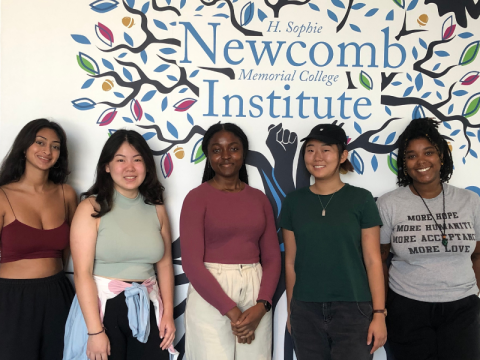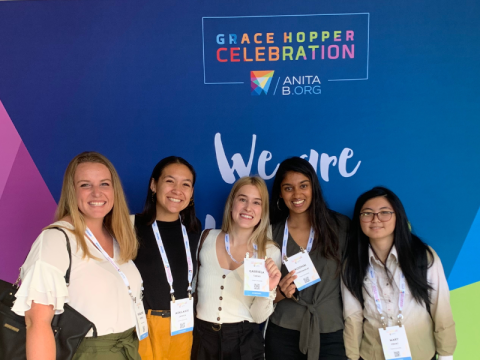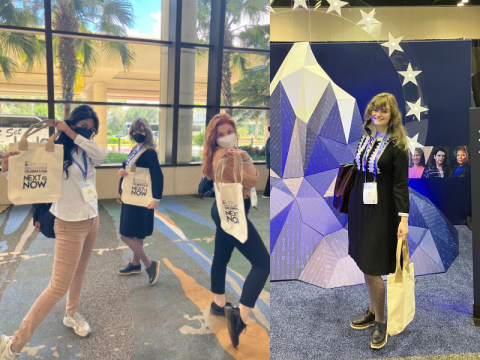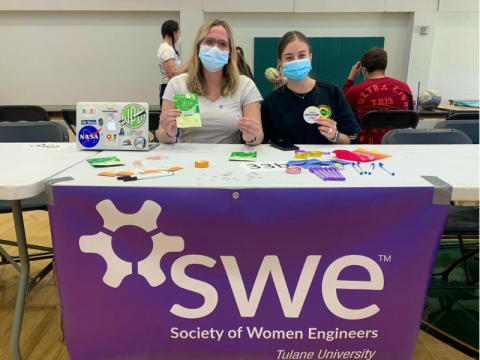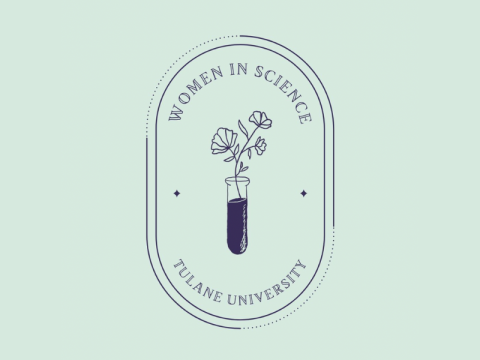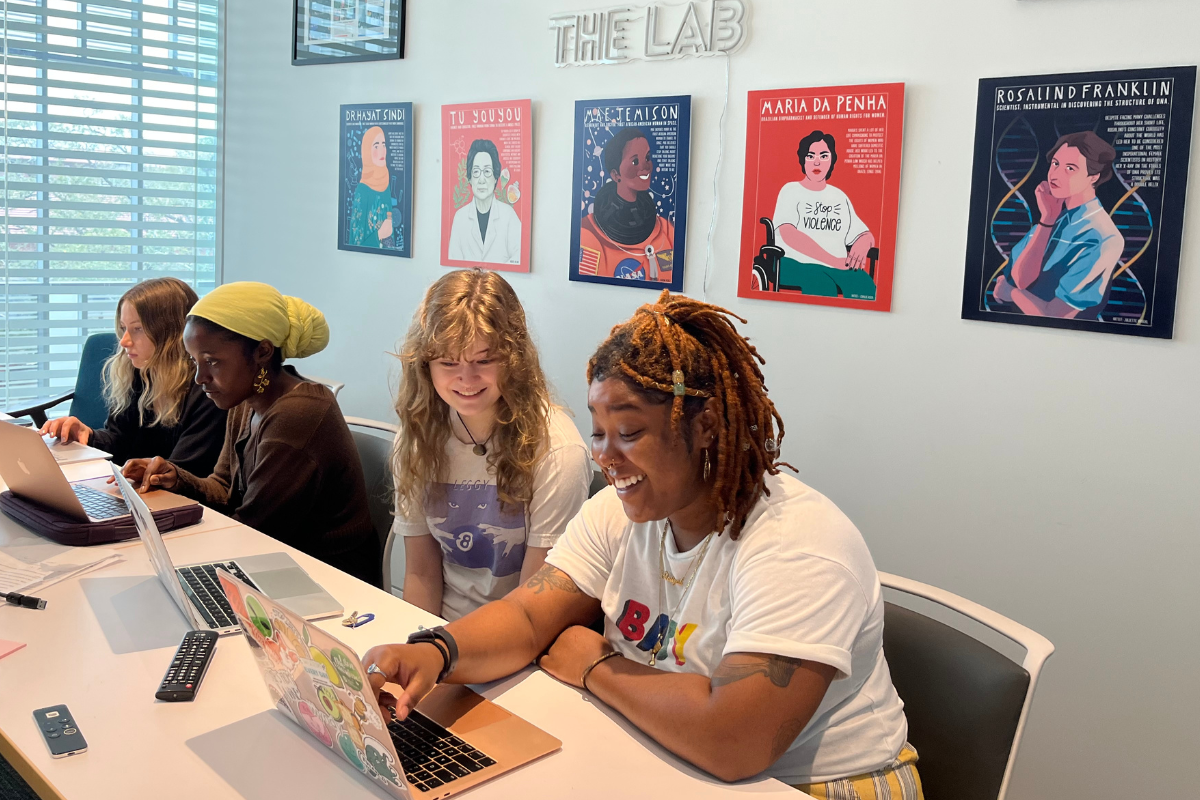
The Technology and Digital Humanities Lab (The Lab) at Newcomb Institute supports undergraduates in gaining technical and feminist leadership skills while building a diverse portfolio of technology projects. All students with interest in feminist technology studies and working collaboratively on a scrum team within a feminist lab setting are welcome to apply, regardless of major or skill level.
The Lab also partners with the Equity in Technology and Society of Women Engineers student organizations to encourage networking and the building of caring and supportive communities
Within our Lab space, students work towards expanding their technical skill sets, contributing to the development of technical aspects of digital research projects, and supporting instructional technology initiatives, while also learning about feminist practices for implementing design and development work, equitable collaboration, partnerships, and networking strategies, and building caring technology communities that think critically about the impact of technology on social justice issues such as gender equity.
Lab's Outcomes:
- Works towards reducing the gender gap in technology by building supportive feminist-minded technology communities for undergraduates at Tulane University.
- Makes technology and digital research more accessible and relevant for technical and non-technical majors through interdisciplinary collaboration with peers, faculty, and community partners.
- Creates a process for viewing digital research and technical work as connected to social and humanities-based research questions and issues and provides a framework for working through those questions using feminist pedagogies and epistemologies.
Lab's Objectives for Interns and Grantees:
-
Work concurrently on a range of digital scholarship /research projects related to gender and social justice of Tulane faculty, Newcomb Institute, and community partners while building a portfolio that represents an array of technical, research, and essential skills such as digital media, data, computing, mapping, and digital archiving.
-
Collaborate and network as part of an interdisciplinary feminist-minded technology community on campus with peers and faculty.
-
Examine through scholarly curriculum and praxis how feminist technology leadership practices and gender and technology studies enhance job-market preparation, professional development, product design, customer service, technical collaboration, and networking to bring about gender equity in technology.
-
Become a maker and a critic of open-sourced technical and scholarly knowledge/products such as project deliverables, technology conference/product reviews, project manuals, and scholarship about gender and other intersecting identities as it pertains to the field of technology studies.
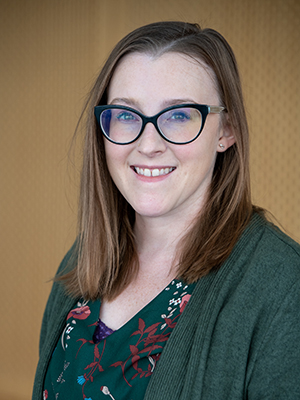
Dr. Jacquelyne Thoni Howard, the Administrative Assistant Professor of Technology and Women's History, manages the research and technology initiatives relating to Digital Humanities, Technology Studies, and Instructional Technology at Newcomb Institute. She directs several student programs located within the Technology and Digital Humanities Lab.
For more information, about Dr. Howard’s research, teaching, and programs, view her faculty bio.
At Tulane, Newcomb Institute faculty offers the following courses and workshops focused on technology and society:
- TIDES course Gender and Technology Design, Dr. Jacquelyne Thoni Howard
- TIDES course Surveillance, Data, and Society, Dr. Jacquelyne Thoni Howard
- History course, Digital History, Dr. Jacquelyne Thoni Howard
- School of Liberal Arts Summer Programs, Contagious Surveillance, Dr. Jacquelyne Thoni Howard
- INTU-2500: Digital Scholarship
- Newcomb Summer Session, Decolonizing Feminisms, Dr. Jacquelyne Thoni Howard
- Digital Feminisms Workshop Series, Dr. Jacquelyne Thoni Howard
- Digital Project Management Tools for Feminist Collaborations
- Visualizing a Feminist Research Dilemma in 75 minutes
- Zotero and Feminist Research
- Digital Portfolio Workshop: Communicating Your Research
- Feminist Data Visualization Workshop
- Leveraging your LinkedIn Profile to Communicate your Research and Work
- Introduction to Digital Humanities and Digital Exhibits
- Digital Storytelling Workshop
- Online Social Media Safety
Since 2017, we have partnered with Tulane faculty, staff, and students and members of the Greater New Orleans community to produce digital research projects, such as:
- Geoff Dancy, "Transitional Justice Database Project”- Technologies: Airtable, Microsoft Access
- Kate Adams & Susan Tucker, “Beautiful Sisterhood of Books Database Project” - Technologies: WordPress, Database Administration
- Chris Oliver, “Plotting a Critical Visualization Media Lab” - Technologies: WordPress, Local host Development
- Elizabeth McMahon, “Letters from Africa Project” - Technologies: WordPress, Database Administration
- Vicki Mayer & Kelley Crawford, “Curation and ViaNolaVie Magazine” - Technologies: Adobe Photoshop
- Tiffany Gonzalez, “Changing Representation: Tracing Latina Involvement in American Politics” - Technologies: WordPress, Tableau, Flourish
- Eric Herhuth, “Animate Energies: Society for Animation Studies 32nd Annual Conference” - Technologies: Qualtrics
- Clare Daniel & Maeve Wallace, “How Birth Outcomes Relate to Healthcare Provider Distribution in Louisiana: An Interactive Map” - Technologies: WordPress, Tableau
- Jaelle Scheuerman, “Artificial Intelligence for Social Good”
- Mirya Holman, “Mapping Politics, Intersectionality, and Equality in New Orleans Github”
- Tony Weiss, “Macroeconomic Graphs A/V Project”
- Kelsey Williams and Sally Kenny, “Kenya Reproductive Health Website”
- Sue Mobley, “Sites of the Resistance”
- Jaelle Scheuerman, “Engaging Community Stakeholders in Artificial Intelligence”
- Roseanne Adderly, Ph.D., “Frances Joseph Gaudet Legacy Project”
- Joan Jensen, “Junior Philharmonic Society of New Orleans”
- Dan Sharpe, Ph.D. “The Music Box Village Videos”
- Freddi Evans, "The Congo Square Legacy Project"
- Laura Blokker and Andrew Lyles, "Transformative Preservation"
- Nell Bolton and Rosanne Adderly, "Frances Gaudet Legacy Project"
- Thuy Le, "The Water Tracker"
- Dan Sharpe, "Naná tava lá"
- Brent Fortenberry, "HARP"
Newcomb Institute calls for the proposals of Digital Scholarship and Digital Media projects to sponsor. If selected, the Digital Research Internship Scrum team (a pre-selected group of undergraduates) will work on your project during the 2020-2021 year.
The Scrum Model:
To model standards in the technology industry, interns work on a scrum team, an agile framework. The team works together on multiple projects at a time. The week-to-week workflows are managed by Dr. Jacquelyne Howard.
If the proposal is accepted, the Product Owner (faculty/staff/community) will work with Dr. Jacquelyne Howard to create a project plan and work with the Product Developer Intern throughout the semester. The Product Developer will continuously communicate with the Product Owner about the team's progress. Owners will be invited throughout the semester to join the team meetings and open houses.
Eligibility
Tulane faculty, graduate students, staff, or New Orleans community members who incorporate or want to incorporate computing into their research and advocacy work are eligible. As a Product Owner, you must be willing to:
- work within the Scrum model framework.
- communicate closely with the product developer intern by providing feedback, being forthcoming about project details and status, and answering any questions. Ensure that any assistants are knowledgeable of project goals and actively working with the team.
- collaborate with Dr. Jacquelyne Howard to write a syllabus/project plan with goals, objectives, deadlines, and a sustainability plan. The project plan will be due by the first day of Fall classes.
- allow Newcomb Institute to promote the project and interns' work through a digital poster and write-ups shared on social media and the Technology and Gender zine and website.
- acknowledge the sponsorship of Newcomb Institute and the work of those associated with the lab in supporting your project in any publications and websites relating to the project.
- make an effort to attend the technology showcase and other invited events, as able.
Project Criteria
The project proposal must meet one or more of the criteria listed below. This criterion has been modified from the National Endowment for the Humanities:
- creating or enhancing experimental, computationally-based methods or techniques that contribute to the humanities, sciences, or community;
- pursuing scholarship that examines the history, criticism, and philosophy of digital culture and its impact on society, or explores the philosophical or practical implications and impact of digital scholarship or gender and STEM; or
- revitalizing and/or recovering existing digital projects that promise to contribute substantially to scholarship, teaching, or public knowledge.
This program accepts proposals throughout the semester on a rolling basis. To apply, send a 100-word proposal to Jacquelyne Thoni Howard, Ph.D. (jhoward8@tulane.edu), or reach out for more information.
Click on the links below for more information about our programs and to view the Lab's zines.
